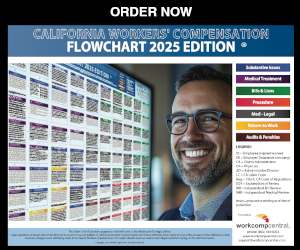Industry Insights
February 4, 2019
Gorman: Let's Cap the Well
- State: California
- - 0 shares
We have been seeing a cottage industry in the area of non-independent bill review medical-legal disputes over the past three years.

Patrick C. Gorman
The usual drivers of lien litigation all now purport to be a med-legal service providers, and why not? Upon review of the non-IBR medical-legal dispute statutes, why would a lien-based vendor want any status other than a med-legal service provider?
This issue (who is and who isn’t) has been expectedly contentious, because if the service provider is not performing med-legal services (defined under Cal. Lab. Code § 4620), then it is not entitled to presumptions, penalties, interest and costs.
The friction arises out of the inquiry of who is not a medical-legal service provider. While there is a clear definition of who is performing medical-legal services in some cases (a panel qualified medical evaluator requested pursuant to Cal. Lab. Code 4060, for example), there is unfortunately not clear precedent (and even conflicting precedent) of who is not performing medical legal services in a case.
In a recent panel decision (Celiflora Lopez v. Harbor View Farms), the Workers' Compensation Appeals Board found there was no contested claim where the claim was not yet denied, and thus the purported medical-legal service provider was not a qualified provider pursuant to Cal. Lab. Code 4620 (and therefore not entitled to penalties, interest and costs).
But how does this WCAB decision square with prior WCAB guidance that the first set of records requested by counsel for an injured worker are medical-legal services regardless of the compensability determination by a carrier (Ozuna v. Kern County Superintendent of Schools)? Possibly the question of whether the records were used by applicant attorney was focused on, and statutory construction ignored or viewed as ancillary, but the conclusion reached in Ozuna appears to be more than dicta.
The statutory language appears clear. A medical-legal service cannot be performed until there is a contested claim (not a contested issue), and the statute defines what a contested claim is. Unfortunately, the common amounts in controversy are scoffed at when weighted against litigation costs in that specific case.
The appetite for spending hours in trial, reconsideration and potentially further appeal over an invoice of $2,000 (and amount in controversy of $4,000 after penalties, interest and attorney’s fees are added) is wanting. We spend much time evaluating these considerations and unfortunately, no matter how good an argument we may have for defending the case under Cal. Lab. Code § 4620, clients ultimately are —understandably — in a position where their decision must be premised on a cost/benefit analysis rather than the legality of an opponent’s position.
Moreover, workers' compensation judges want to focus their impacted calendars on threshold issues for injured workers, and not a few thousand dollars between two corporate entities. This all has contributed to a landscape of gamesmanship, waste and abuse on the Non-IBR medical-legal front.
Should these disputes be viewed as global and approached as such? So long as they are viewed as claim-specific, the market for services purported to qualify under Cal. Lab. Code § 4620 will continue to expand. Clear statutory language may need affirmation en banc or through the District Court of Appeals, but in the meantime there is a lack of strategic coordination on the defense side of this equation.
While this area of litigation expands, we now see copy services invoicing for second and third record sets, many of which were never requested by applicant’s attorney. This is another cost leak that has global cost-driving implications. When viewed as a one-dimensional matter — $30 for a third set of records on three facilities — we derive only a $90 controversy.
Justice Richard Posner famously observed that “… only a lunatic or a fanatic sues for $30.” But what then, if we take this single issue under global consideration?
We can estimate to global impacts of this single issue by taking Workers' Compensation Insurance Rating Bureau and Employment Development Department data. There are approximately 18 million employees in California, and approximately 15.6 claims per 1,000 workers (2016 WCIRB). This equates to approximately 285,000 workers’ compensation claims per year.
If we presume that only 10% become litigated, that derives 28,500 litigated claims. If we then assume three duplicate record sets in only half of these litigated claims (total of $90 in 14,250 claims) we arrive at $1,282,500 in cost leakage (although the amount of fraud, waste and abuse is likely far in excess of this amount just on the duplicate-record issue alone).
The next issue we must consider is how many copy service providers are participating in the non-IBR med-legal or lien provider marketplace (less than a handful). What if we apply these figures to the first set of records in a case that is not contested? And if we also factor in the page limit in the fee schedule, and come to discover that the copy service went out to the same facility two or three times because the records are in excess of the fee schedule initial page limit? This is not a prospective concern, it is current and ongoing.
While cost-containment measures generally focus on treatment and indemnity, the expansion of cost leakage under medical-legal services continues to expand. This expansion has global implications: Well into, if not in excess of, the seven-figure stratosphere. There needs to be strategic litigation to cap the well of fraud, waste and abuse that is currently spilling unchecked.
When faced with threshold determinations, think globally and look to your most aggressive partner in litigation.
Practice pointer
When filing a petition for determination of non-IBR medical-legal dispute, you must serve a notice of hearing on the purported service provider. The Electronic Adjudication Management System does not have a designation for med-legal service providers, and they cannot be made a party in EAMS under lien claimant because they have not paid a filing fee.
Save yourself a wasted appearance, and serve a notice of hearing on the purported service provider.
Patrick C. Gorman is a Partner at Bradford and Barthel, and managing attorney of the firm's Redding office. This entry from Bradford & Barthel's blog appears with permission.
Advertisements
Columns
- Kamin: State Senate Committee to Consider SIBTF Bill 07/07/25
- Anders: Self vs. Professional MSA Administration: Which Is Right for the Injured Worker? 06/30/25
- Geaney: Court Affirms Finding of Police Officer's Joint Employment 06/27/25
- Fricker: A New Era for Comp Subrogation 06/25/25
- Kamin: AI for HR Equals Bad Injury Reporting 06/20/25
- Montgomery: Will DWC Ignore New Law? 06/18/25
- Kamin: 4th DCA Clarifies DOI From Date of Knowledge 06/16/25
- Wade: Are the Old Ways Gone? 06/13/25
- Snyder: Trust Your Intuition 06/12/25
- Montgomery: DIR Director Reportedly Resigning 06/11/25
- Gelman: Supreme Court to Review COVID Compensability 06/06/25
- Paduda: WCRI's New Studies 06/05/25
- Moore: 187 Pages of WCRI State Stats 06/02/25
- Paduda: The Gutting of NIOSH 05/30/25
- CAAA: Left in the Smoke 05/28/25
- Gelman: Intentional Wrong? 05/27/25
- Wroten: State's Workers' Comp Crisis a Stark Contrast to National Stability 05/23/25
- Montgomery: Comp Is a Cash Cow, but Insurers Want Higher Rates 05/21/25
- Snyder: Credible Negotiation 05/19/25
- Paduda: The State of Work Comp 05/16/25
Now Trending
- Workers' Compensation News
-
Calif. Paul
Randall Implicated in $270 Million
Scam Targeting…
Posted on Jul 1, 2025Brian Allen says: “How in the world can Randall ever get a license to open…”
-
Calif. WCIRB
Estimates $1.3B Underwriting Loss
for…
Posted on Jul 2, 2025
-
N.Y. Another
Lawsuit Alleges Widespread Scheme
to Stage…
Posted on Jul 2, 2025
-
Calif. Private
Self-Insured Frequency Drops; Paid
and Incurred Losses…
Posted on Jul 3, 2025Tom Martin says: “When will we see a study examining the effect of denied and…”
-
Calif. DWC Updates
Fee Schedule, Treatment…
Posted on Jul 7, 2025
-
N.M. High Court
Invalidates Cap on Attorney Fees in…
Posted on Jul 8, 2025
-
Calif. P&T
Committee Meets July…
Posted on Jul 7, 2025
-
Neb. Auditor Says
State Paid $18,900 in SIF Benefits
to Deceased…
Posted on Jul 1, 2025
-
N.J. Legislature
Unanimously Passes Bill to Require
Counseling for First…
Posted on Jul 1, 2025
-
Texas Ex-Police
Officer's Deficient Briefing
Compels Court to Uphold Dismissal
of…
Posted on Jul 3, 2025
Jobs
- Associate Attorney
- Workers' Compensation Claims Adjuster, Senior ľ Remote ľ California
- Nurse Case Manager - Workers' Compensation
- Associate Attorney
- Associate Attorney
- Senior Attorney/Assistant Attorney 1/2/3 (NY HELPS) WCB Item #8000
- Compensation Claims Referee, SG-28 (NY HELPS) WCB Item# 4218 Workers' Compensation Jobs
Upcoming Events
Sep 2-4, 2025
San Diego Elevate Workers' Com
We are thrilled to announce that Early Bird registration is OPEN for ELEVATE« 2025! This year's …
Social Media Links
c/o Business Insurance Holdings, Inc.
Greenwich, CT 06836




No Comments
Log in to post a comment